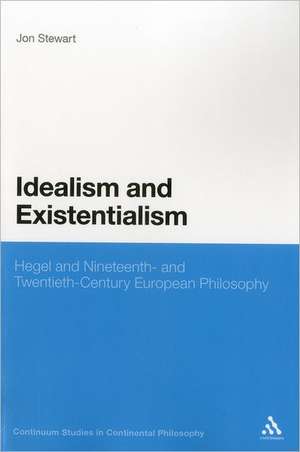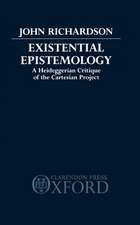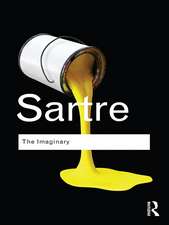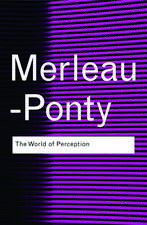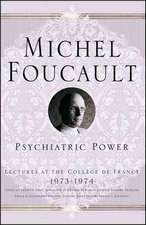Idealism and Existentialism: Hegel and Nineteenth- and Twentieth-Century European Philosophy : Continuum Studies in Continental Philosophy
Autor Professor Jon Stewarten Limba Engleză Paperback – 25 ian 2012
The history of Continental philosophy is often conceived as being represented by two major schools: German idealism and phenomenology/existentialism. These two schools are frequently juxtaposed so as to highlight their purported radical differences. There is a commonly held view that an abrupt break occurred in the nineteenth century, resulting in a disdainful rejection of idealism in all its forms. This break is often located in the transition from Hegel to Kierkegaard. The history of philosophy in the first half of the nineteenth century has thus been read as a grand confrontation between the overambitious rationalistic system of Hegel and the devastating criticisms of it by Kierkegaard's philosophy of existence.
This work aims to undermine this popular view of the radical break between idealism and existentialism by means of a series of detailed studies in specific episodes of European thought. As a whole, this book represents an important attempt to demonstrate the long shadow cast by Kant and Hegel over the subsequent history of European philosophy.
This work aims to undermine this popular view of the radical break between idealism and existentialism by means of a series of detailed studies in specific episodes of European thought. As a whole, this book represents an important attempt to demonstrate the long shadow cast by Kant and Hegel over the subsequent history of European philosophy.
| Toate formatele și edițiile | Preț | Express |
|---|---|---|
| Paperback (1) | 258.69 lei 6-8 săpt. | |
| Bloomsbury Publishing – 25 ian 2012 | 258.69 lei 6-8 săpt. | |
| Hardback (1) | 892.32 lei 6-8 săpt. | |
| Bloomsbury Publishing – iun 2010 | 892.32 lei 6-8 săpt. |
Din seria Continuum Studies in Continental Philosophy
- 23%
 Preț: 179.10 lei
Preț: 179.10 lei - 31%
 Preț: 890.14 lei
Preț: 890.14 lei - 23%
 Preț: 262.25 lei
Preț: 262.25 lei - 31%
 Preț: 890.55 lei
Preț: 890.55 lei - 22%
 Preț: 949.17 lei
Preț: 949.17 lei - 14%
 Preț: 1007.12 lei
Preț: 1007.12 lei - 31%
 Preț: 889.88 lei
Preț: 889.88 lei - 22%
 Preț: 1007.12 lei
Preț: 1007.12 lei - 22%
 Preț: 888.58 lei
Preț: 888.58 lei -
 Preț: 256.02 lei
Preț: 256.02 lei - 22%
 Preț: 949.17 lei
Preț: 949.17 lei - 22%
 Preț: 948.91 lei
Preț: 948.91 lei - 22%
 Preț: 948.66 lei
Preț: 948.66 lei - 31%
 Preț: 891.51 lei
Preț: 891.51 lei - 22%
 Preț: 948.34 lei
Preț: 948.34 lei - 22%
 Preț: 256.49 lei
Preț: 256.49 lei - 14%
 Preț: 946.53 lei
Preț: 946.53 lei - 31%
 Preț: 890.72 lei
Preț: 890.72 lei - 14%
 Preț: 1005.98 lei
Preț: 1005.98 lei - 14%
 Preț: 889.88 lei
Preț: 889.88 lei - 14%
 Preț: 947.54 lei
Preț: 947.54 lei - 31%
 Preț: 947.54 lei
Preț: 947.54 lei - 22%
 Preț: 1005.41 lei
Preț: 1005.41 lei - 22%
 Preț: 947.11 lei
Preț: 947.11 lei - 23%
 Preț: 255.94 lei
Preț: 255.94 lei - 31%
 Preț: 948.34 lei
Preț: 948.34 lei - 22%
 Preț: 947.54 lei
Preț: 947.54 lei - 22%
 Preț: 946.53 lei
Preț: 946.53 lei - 22%
 Preț: 947.54 lei
Preț: 947.54 lei - 22%
 Preț: 889.39 lei
Preț: 889.39 lei - 22%
 Preț: 257.50 lei
Preț: 257.50 lei - 22%
 Preț: 1005.41 lei
Preț: 1005.41 lei - 31%
 Preț: 889.88 lei
Preț: 889.88 lei - 31%
 Preț: 947.94 lei
Preț: 947.94 lei - 22%
 Preț: 947.11 lei
Preț: 947.11 lei - 22%
 Preț: 947.86 lei
Preț: 947.86 lei - 14%
 Preț: 891.51 lei
Preț: 891.51 lei - 22%
 Preț: 948.10 lei
Preț: 948.10 lei - 31%
 Preț: 891.36 lei
Preț: 891.36 lei - 22%
 Preț: 1005.72 lei
Preț: 1005.72 lei - 31%
 Preț: 888.97 lei
Preț: 888.97 lei - 14%
 Preț: 947.54 lei
Preț: 947.54 lei - 19%
 Preț: 373.30 lei
Preț: 373.30 lei - 11%
 Preț: 373.30 lei
Preț: 373.30 lei - 22%
 Preț: 1007.62 lei
Preț: 1007.62 lei - 22%
 Preț: 1005.72 lei
Preț: 1005.72 lei - 22%
 Preț: 946.53 lei
Preț: 946.53 lei - 22%
 Preț: 948.34 lei
Preț: 948.34 lei
Preț: 258.69 lei
Nou
Puncte Express: 388
Preț estimativ în valută:
49.51€ • 53.76$ • 41.59£
49.51€ • 53.76$ • 41.59£
Carte tipărită la comandă
Livrare economică 23 aprilie-07 mai
Preluare comenzi: 021 569.72.76
Specificații
ISBN-13: 9781441159687
ISBN-10: 1441159681
Pagini: 304
Dimensiuni: 156 x 234 x 16 mm
Greutate: 0.42 kg
Editura: Bloomsbury Publishing
Colecția Continuum
Seria Continuum Studies in Continental Philosophy
Locul publicării:London, United Kingdom
ISBN-10: 1441159681
Pagini: 304
Dimensiuni: 156 x 234 x 16 mm
Greutate: 0.42 kg
Editura: Bloomsbury Publishing
Colecția Continuum
Seria Continuum Studies in Continental Philosophy
Locul publicării:London, United Kingdom
Caracteristici
Enjoins the reader to rethink some mistaken clichés about the development of Continental philosophy.
Notă biografică
Jon Stewart is Associate Research Professor at the Søren Kierkegaard Research Centre, University of Copenhagen, Denmark and a member of the Royal Danish Academy of Sciences and Letters
Cuprins
Acknowledgements Abbreviations of Primary Texts Preface Introduction Part I: Hegel and German Idealism 1. Hegel and the Myth of Reason 2. Hegel's Phenomenology as a Systematic Fragment 3. The Architectonic of Hegel's Phenomenology of SpiritPart II: Between Idealism and Existentialism 4. Points of Contact in the Philosophy of Religion of Hegel and Schopenhauer 5. Kierkegaard's Criticism of the Absence of Ethics in Hegel's System 6. Kierkegaard's Criticism of Abstraction and His Proposed Solution: Appropriation 7. Kierkegaard's Recurring Criticism of Hegel's "The Good and Conscience" 8. Hegel and Nietzsche on the Death of Tragedy and Greek Ethical Life III. Existentialism 9. Existentialist Ethics 10. Merleau-Ponty's Criticisms of Sartre's Theory of Freedom 11. Sartre and Merleau-Ponty on Consciousness and Bad Faith Bibliography Index of Persons Subject Index
Recenzii
"Stewart's fresh approach to the so-called 'antagonism' between idealism and existentialism is both welcome and edifying. His careful, nuanced scholarship encourages the reader to re-consider and re-evaluate the major debates that shaped the development of European philosophy in the nineteenth and twentieth centuries." - Daniel Conway, Texas A&M University, USA
According to the conventional story told by intellectual historians, the nineteenth century witnessed a major break in the philosophical tradition, jumping from German Idealism (identified with Hegel) to existentialism (identified with Kierkegaard). Jon Stewart disagrees: and in Idealism and Existentialism he challenges this account and puts forward an alternative view of Hegel. (While most of the chapters consist of articles or lectures already published in one form or another, by collecting them in book form Stewart makes them more accessible to readers and, taken in their totality, an overarching argument emerges.)
According to the conventional story told by intellectual historians, the nineteenth century witnessed a major break in the philosophical tradition, jumping from German Idealism (identified with Hegel) to existentialism (identified with Kierkegaard). Jon Stewart disagrees: and in Idealism and Existentialism he challenges this account and puts forward an alternative view of Hegel. (While most of the chapters consist of articles or lectures already published in one form or another, by collecting them in book form Stewart makes them more accessible to readers and, taken in their totality, an overarching argument emerges.)
